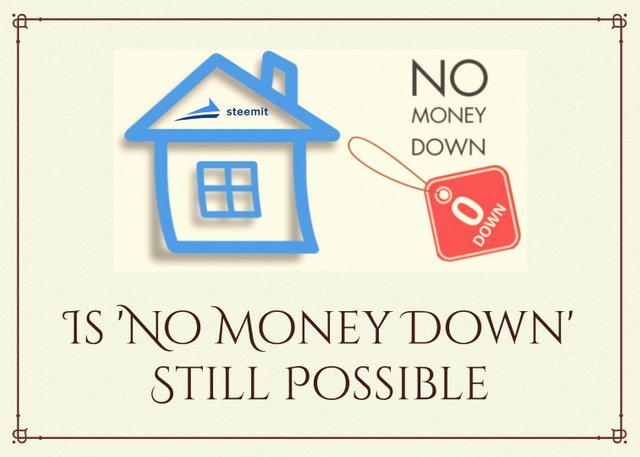Is 'No Money Down' Still Possible

One of the most common questions Im asked of late is is it still possible to buy property with no money down?
So Id like to explain what No Money Down really is, how it came about and whether its still possible.
No Money Down was a concept coined by US property investor Robert Allen way back in the 90s. It was nothing new in the US but Robert was amongst a new breed of investors putting their thoughts in writing or onto tapes and selling the idea sound familiar!
Roberts strategies involved buying properties using a variety of methods to get your money back out of a property investment as soon as possible or not even putting money in in the first place. These strategies included many of the ones investors have seen and used for the past few years and others that are only now becoming more popular. These include investor partners, instant refinancing, bridging, using loans and credit cards, cash backs, vendor gifted deposits, sub sales, seller financing, options and lease options to name just a few.
Its important at this point to note however that there are marked differences in property investment lending and legislation in the US and that many strategies are far more acceptable there than elsewhere.
However, suitably behind the US market the No Money Down concepts only really started to take off in the UK in the early 2000s as the buy to let market took off.

The catalyst for this was a combination of a worldwide property boom and mortgage backed securities leading to a massive influx of cash into the worldwide markets. Banks all over the world were falling over themselves to lend on property and new lenders sprouted up all over the place. Loan to values increased, rates dropped and investors piled into property. The result was lax lending and regulation however.
The typical No Money Down strategy used here in the UK was some form of instant refinancing and or vendor gifted deposit, as follows:-
Instant Refinancing
Property value 100,000
Agreed purchase price 75,000
Obtain a mortgage offer from a lender of 85% based upon the 100,000 valuation the lender was informed this was a remortgage which technically it was so there was no harm in obtaining the valuation and offer based upon the true valuation of the property.
Bridging or cash was used to purchase the property at 75,000 and the lender would instantly release the 85,000 mortgage. The investor paid back the cash or bridging and pocketed 10,000 before costs.
As the boom heightened it was not uncommon for investors to simply draw down on the 85,000 without actually purchasing the property for 75,000 as it was all a same day transaction. Not strictly legitimate but lenders seemed content to turn a blind eye at the time.

The second method was with some form of vendor gift or cash back arrangement.
Using the same figures a purchase mortgage would be obtained based upon a theoretical purchase price of 100,000. The seller (vendor) would then provide a gifted deposit of 15,000 and cash back of 10,000 or a cash back of the full 25,000.
Again somewhat questionable practices but lenders seemed content to let it happen as did the other parties involved in the transaction.
Then along came the credit crunch.
As a result of this regulations tightened hugely from all quarters, legal, FSA, lenders criteria and terms and conditions. Added to which all the parties who were now losing money started to look for those who they could blame. 3 years after the credit crunch solicitors, valuers, mortgage brokers and investors are still being investigated, sued and even imprisoned as a result of transactions done back then.
The primary result of all of this was a clearer mandate from lenders that the actual purchase price must be declared and a failure to do so amounts to non-disclosure.
There are numerous No Money Down schemes in operation including but not limited to the following:-
- Vendor cash back
- Vendor gift
- Equity allowance
- Sub sale
- Option agreement used to create the equivalent of a sub sale without an actual completion
- Using a bridge for the deposit
- Build up of equity (rent credits, etc)
Not one of these strategies does not involve some form of non-disclosure of the actual purchase price. Let me make this quite clear non-disclosure is fraud. Or more accurately obtaining a pecuniary advantage by deception in legal circles. In English this means that you deceptively applied for a mortgage to obtain a financial advantage.

The fraud is committed by the mortgage applicant. Thats you!
Beware of anyone who tells you that the scheme they use has been declared to the lender. This is a common phrase I hear which is often a misnomer.
I think you will find the answer most enlightening!
Do not be fooled into thinking that the other parties would not do such strategies if it was fraud. While a complicit valuer, broker or solicitor may well face prosecution be under no illusion that the fraud is committed by you the mortgage applicant.
Ignorance is not a legal defence either; you cannot claim that you did not know.
If you know that you are paying a net price of 75,000 for a property and that the broker/solicitor is informing the lender that you are paying 100,000 for it then you have committed a fraud.
You cannot claim that it was an electronic application and that you were unaware. Brokers should provide you with some form of summary of your mortgage whether that be a Key Facts Illustration, a letter or even a copy of the application form itself (these can be provided even on electronic application systems). So there is simply no excuse that you could not have known.
To my knowledge there is one private lender who is prepared to lend against value for buy to let purposes. I will not name them but suffice to say I have done a lot of research upon their offering and at best I think it is highly risky strategy that is extremely costly and will not suit 95% of investors and at worst it may well be some form of Ponzi scheme or scam.
Aside from this NONE of the buy to let lenders will allow a mortgage against the market value of the property. In all cases they will lend against the LOWER of purchase price or valuation.

Again if you do not declare your actual purchase price to the lender then it is non-disclosure and that is fraud.
So if you are using any of the following lenders to transact a No Money Down deal then I can assure you that you are committing fraud:-
- BM Solutions
- The Mortgage Works
- Northern Rock
- Aldermore
- Precise
- Godiva
- NatWest
- Post Office
- Woolwich
- Platform
- Paragon
This list is not exclusive; these are simply the most common buy to let lenders.
So what can you do?
Lease options, options, using other peoples money, credit cards, loans, seller financing are all possible. BUT do not be fooled into thinking that these strategies are without their problems despite the hype!
Many of the lease option and options strategies being taught breach a number of FSA regulations for example.
Lenders want you to put your own money into a deal and are asking for evidence of saved up deposits more and more. This means that if someone pops a 25k deposit into your account the day before youre due to complete you may well find that your mortgage is refused.
Depending upon the relationship you have with your bank and generally if you are sufficiently high net worth you may be able to arrange a special lending facility to enable purchases against open market value.
Also some mezzanine/specialist commercial finance lenders/merchant banks may consider purchase against open market value but rates and terms are likely to be strict and not palatable to the average investor.
The best strategies are to use bridging finance or refurbishment mortgages.
Refurbishment mortgages are available from a couple of lenders and are hugely beneficial to investors. These werent available pre credit crunch so we should be grateful for small mercies!
You will be required to put in a deposit at purchase but then after refurbishment you can remortgage the property to a specified limit. You wont get all of your money out on most deals but you can get a good portion of it back enabling you to buy another property and keep building your portfolio.
Bridging firms will usually also require you to put in a 20-30% deposit these days. Open market value lending is really not achievable for most deals. There are a couple of bridging lenders who will look at the valuation of the property and may be more generous in their lending if there is a substantial discount. BUT this is not buy to let finance and is expensive.
If you opt to use bridging then you can often combine using investor partners, loans and credit cards etc should you wish to as these lenders are less interested in where your deposit comes from.
Once you have carried out any works or waited a suitable time then you can look to remortgage the property at open market value. Most lenders require you to have owned the property for at least 6 months before remortgaging but a couple will consider remortgaging in less time especially if you have done works on the property which can be evidenced.
You can get all or at least most of your money back out with this route though it is not a cheap way of doing it.
In Summary
My view is it is good business sense to reduce your costs and expenses but not by committing a crime! I see NMD schemes as no different to tax evasion. Yes you should minimise and even find ways to legitimately avoid tax but evading is a whole different ball game.
Im a huge believer in getting your money back out of any investment as soon as possible. When I invest in anything I always set out with the aim of pulling my initial capital out asap and then anything from that point forward is a bonus. Conversely anything I lose was surplus cash and not my original investment.
This has certainly always been my aim in property. We had a lump of cash to start with and intended to build a portfolio with it. I had to get it back out and working again or we would run out of cash it was that simple. However, we at least had some cash to start with; small a sum as it was. What concerns me are those people who want to do no money down because they dont have any cash at all.
Even if you still choose to acquire property with no money down despite my warnings it can still be a very cash intensive business. Within weeks of buying a property you could find the boiler breaks down or you struggle to rent it out and need to cover the mortgage for a few months. If you dont have any cash reserves at all then this will be your downfall. So if youre looking for the holy grail of no money down property investments BECAUSE you dont have any money at all then stop now.
While many newer investors have only experienced instant refinancing, high LTVs and low rates this was more of a temporary blip than the long term reality of property investing. Prior to the introduction of buy to let mortgages you were lucky to get anywhere near 70% on a commercial loan and it was typically a repayment mortgage on commercial rates. When I got started in property we had to put in large deposits and wait at least 6 months before a revaluation and the hope you could withdraw your money.
As both investors and mortgage brokers we will not get involved in any sort of scheme that involves non disclosure to the lender. If lenders relax the rules or other products emerge I'll be the first to use and promote them but the fact is the world has changed and people need to move with the times.
If you dont wish to then make sure your next deal is a really good one as it could be your last!

Excellent advice. I'd say that as a general rule, if you can't produce a down payment for a property, you shouldn't be purchasing property. The same goes for cars, furniture, etc. Every time I see someone who fell for the no money down scheme it turns out they had no business buying property in the first place; didn't even do enough research to figure out you can set up a loan well ahead of time and produce the downpayment that way. The easiest way is to loan it off another property owned by a family member (providing you're the type of person they'd trust to pay it back and if you're not, you've got no business tackling a mortgage).
In the US I've never come across a situation like that in relation to a property I'd consider simply because I look at inexpensive properties. In Canada if you go below the 20% downpayment you're subject to something called 'mortgage insurance' which is just a way for you to throw away your money as you get nothing for it. For that reason, you don't buy if you don't have the 20%.
You are well versed in this topic! Thank you for the excellent addition to the article and interesting information! I'm interested in the peculiarities of mortgage lending in Canada!
Thanks, trying. In Canada, and this is from my understanding and may not be 100% correct as I am not a professional in this field, as I mentioned its 20% down. The 0% and 10% levels have been removed years ago as a huge number of fucktards took out mortgages they weren't equipped to sustain. The lower downpayment mortgages were also at a higher rate. So let's say the variable rate for a respectable (20%+ mortgage) was 2%, the 10/0% were typically roped into much higher fixed rates (let's say 5%) due to their lack of money and fear of uncertainty, which they can't handle. In the end, they'd end up paying more, with lesser instalments. Meaning it was all interest and the property never got paid off.
I personally believe those types have no business being in the market in the first place. They buy houses, take ridiculous conditions, lack the common sense to bargain while making offers/counter-offers, don't invest in due diligence aka a home inspection, open lines of credit on the house using shady brokerage firms (as you know, if you don't have a portion of the house paid off you can't get a line of credit for it from a real bank), make only the minimum payments, consolidate their remaining debts with the mortgage to a point where if they sell at a profit they'll make nothing, and so forth. I see a mortgage as a 'good debt' as what it is is an investment; but, like in all accounting, the books must balance in the end. If one ends up paying more than the house will appreciate and sell for when it's time, then they may as well go try their luck at the local casino.
Mortgages are not as easy as many people think. Errors are allowed very much. I'm sure, first you need to study all the features of the crediting, and then choose the most suitable. Many people do not do this and burn out. Thank you very much for such a detailed comment and VERY necessary information!
Very insightful, I am going to save this to show others.
Thank you so much! I hope this article will be useful!
With so much debt around the globe, I don't think debt should be promoted or advised by banks. People can be horrible with money management. Nice post!
You are absolutely right! I agree with you. But I hope that they will learn to properly manage their finances! Thanks for the comment!